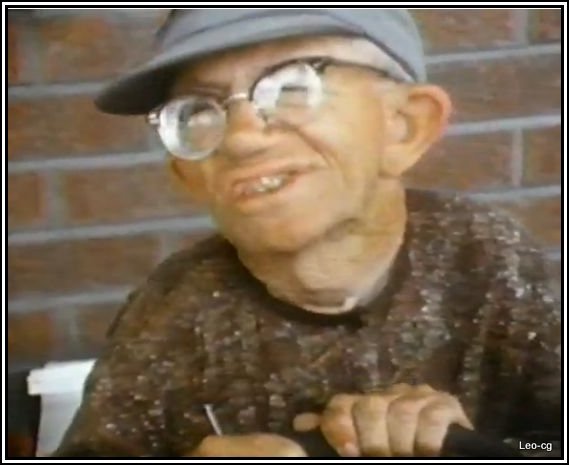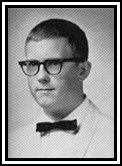|
Leo Beuerman

A memory by Tom Fisher
My friend and classmate, may he rest in peace, Tom Fisher wrote a piece on Leo.
Tom's dad owned the Round Corner
Drug store in Lawrence from 1943 to 1975.
Leo Buerman was a locally famous character; he lived in the Lawrence area all his seventy or so years and an academy award-winning documentary was produced about him by Centron Films, of Lawrence.
He was two and a half feet tall, legally blind and looked as if carved from an apple, with wrinkled skin from years of sun and thinning gray hair.
He always wore a little Key farmer’s cap. His condition made it impossible for him to walk, but he made his way to town anyway.
He drove to Lawrence from his family farm almost daily on a old tractor, specially modified for his needs.
You didn’t need a driver’s license to drive a tractor in Kansas. No test, no inspection, no anything.
He would park his tractor near the corner of Eighth and Massachusetts, next to Lawrence Building and Loan, struggle into a little wooden cart and lower himself to the street on a chain with block and tackle.
He stationed himself on the sidewalk at the corner in front of either the First National Bank or Crown Drug in his cart.
The cart was a little rig with a single seat and a small wooden case with a glass top. Inside the case was his store;
pencils, 10 cents each; ballpoint pens and refills, 50 cents and 10 cents;
little trinkets and items for sale and trade. Friends and passers-by would stop to chat with him as he conducted his daily business.
About dark, he would wheel over to the Round Corner to spend the evening.
He would bang on the front door and I would go over to help him by opening the door and lifting his front wheel over the threshold.
He would position himself in the front of the store and would read the final edition of the Kansas City Star, printed on pink paper to signal the latest, last news of the day.
Leo was almost blind, but could read by holding the paper two or three inches from his thick glasses.
He would call out and I would return the paper to the rack when he was done.
We would trade stories often; he was tone deaf and only a few could converse with him directly.
He would talk and I would write
back. We talked about the “good old days” in Lawrence and the state of the world.
Atomic bombs and the weather. The usual stuff.
He was amused, but troubled, that some little kids were frightened by his strange appearance, but his mood was always upbeat.
He thought that they were harboring childish fears and would grow to accept him, as he felt everyone did.
When the store closed at 9:30 p.m., we would let Leo know that it was time to move. Sometimes, he would wheel onto the sidewalk and up the street to the bus depot to spend the night .
Sometimes, he mounted his tractor and drove through the dark to the family farm.
His tractor was struck by a train on the spur at Sixth and Massachusetts one night.
Leo was slightly injured and had his arm in sling for a while. He could laugh about being shoved down the tracks by that slow-moving train.
Once, Hoyt Kerr, one of the interns clerking in the store, splashed cologne on Leo for a “date” he was teasing him about having.
He was furious; yelling and screaming in his low, yet bird-like little voice.
Hoyt was one of those lucky guys whose voice was entirely audible to Leo.
They talked for hours about everything. Leo spoke often about his mother and the care she gave him as a child.
After his “fight” with Hoyt, Leo told me that he was happy to have friends who would share their jokes with him.
Several years later, after my father died, Leo talked for a bit and said that he, too, missed my Dad and knew that he had been a nice, caring man who was loved by all who knew him.
Leo said,
“You know, I can hear a lot more than people think I can. I pay
attention."
****************************
This story has been shared by Richard Noever
classmate and friend of
Tom Fisher
|

